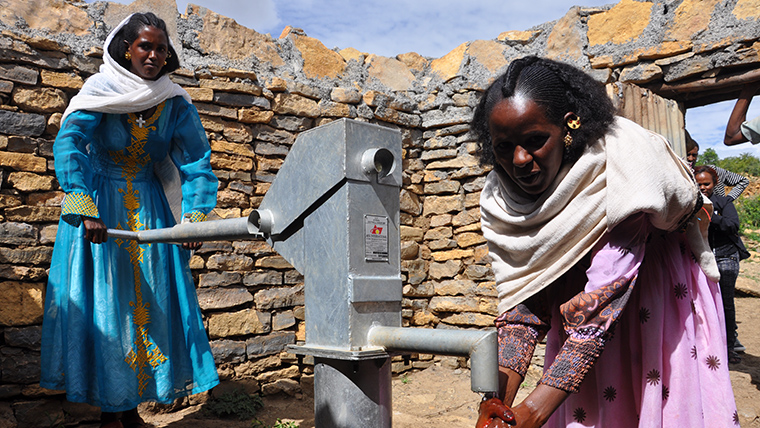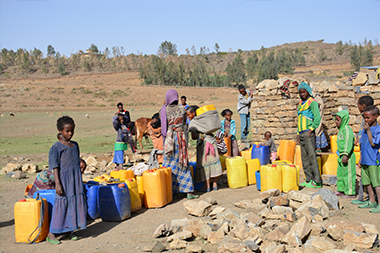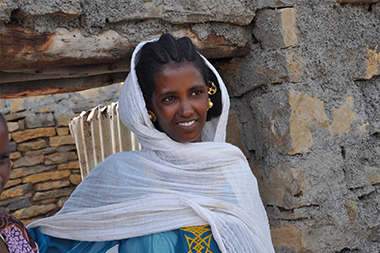Keeping girls safe | Water access in times of El Nino

It was 2:24pm and the temperature was at its highest. There they were; two women clad in blue and pink dresses, standing in what appeared to be a cube structure made of stone. They both wore cotton scarfs with embroidered trimmings covering their well-groomed, braided hair. They looked beautiful and pristine. They stood dignified and proud as they guarded the stone-enclosure, which was actually a shallow well.
Just a month ago, they feared for their lives. Fetching water was an extremely dangerous responsibility.
Letekiros, the woman in the long, pink floral dress, is only 22 and will soon be a first-time mother. She heads the water, sanitation and hygiene committee of her village in Enderta, a district in the Tigray region of Ethiopia.
 Beside Letekiros is Kedan. She is wearing her finest blue dress with gold embroidered accents, typical dress of the traditional Tigraean women. At 24, she is a mother of three young children. “We need to guard this shallow well. It has just been repaired. We need to make sure it won’t become damaged again,” said Letekiros.
Beside Letekiros is Kedan. She is wearing her finest blue dress with gold embroidered accents, typical dress of the traditional Tigraean women. At 24, she is a mother of three young children. “We need to guard this shallow well. It has just been repaired. We need to make sure it won’t become damaged again,” said Letekiros.
World Vision renovated the shallow well in April. Before that, Letekiros and Kedan, like all the other women and young girls in their village would fetch water from the river. Getting water from the river was not easy and safe.
“The drought affected us severely. The nearest water source in our village dried up to the point where we couldn’t get any. As a result, we were forced to walk for two hours to get drinking water from the river. The water from the river is not safe for drinking. But we do not have any choice. We were sharing the water with wild animals. One time there was a dead hyena in the river. We just removed the body, filled our jerry cans with water and walked home. We boiled the water so we could drink it,” explained Kedan.
Walking to the river is not safe either, especially for women and young girls.
“Because we have to walk far, we have to be accompanied by male members of our family to keep us safe from wild animals. Because of this, their time is divided between walking with us, ploughing our land, and cutting stones,” she added, hinting at the impact it had on everyone in the community.
 Stone cutting in the nearby quarry provides a temporary source of income to farmers who cannot plant any crops due to the El Niño. Letekiros’ husband earns the equivalent of £17 for every 16 cubic metres of stones cut into cobblestones, which requires over a weeks' worth of work. The stones are cut and hauled by hand and these are used for constructing houses, fences and roads. According to Letekiros, the newly rehabilitated shallow well will make a significant difference to their lives. For one, the time it takes to fetch water has dropped from over 2 hours to just 30 minutes. They also feel safe from wild animals and are confident that the water is safe to drink.
Stone cutting in the nearby quarry provides a temporary source of income to farmers who cannot plant any crops due to the El Niño. Letekiros’ husband earns the equivalent of £17 for every 16 cubic metres of stones cut into cobblestones, which requires over a weeks' worth of work. The stones are cut and hauled by hand and these are used for constructing houses, fences and roads. According to Letekiros, the newly rehabilitated shallow well will make a significant difference to their lives. For one, the time it takes to fetch water has dropped from over 2 hours to just 30 minutes. They also feel safe from wild animals and are confident that the water is safe to drink.
The newly rehabilitated shallow well is now providing clean water for 37 families. In the local Enderta region, World Vision is set to complete the restoration of a further 30 shallow wells and create four new ones, to provide even more families with clean water access.
“Leading the committee is a huge responsibility but not a difficult one. We have a very good and supportive team,” Letekiros said proudly.
Life may not be easy for Letekiros but she remains optimistic, especially for her upcoming child.
“I look forward to giving birth to a healthy baby. I hope they will become a doctor. I want them to treat the sick people in my community,” she said in a soft voice. She has yet to decide what name she will give her baby.
Ethiopia is currently experiencing its worst drought for decades, affecting an estimated 10.2 million people. More than 224,000 people have now got access to drinkable water after World Vision rehabilitated 58 shallow wells, 13 deep wells and 13 springs in drought affected areas. By acting now we can continue to help children and their families who've already been affected by El Niño and - crucially - we can protect others. Early intervention and preparation will protect children's lives and families' incomes, keeping communities afloat through the crises to come »